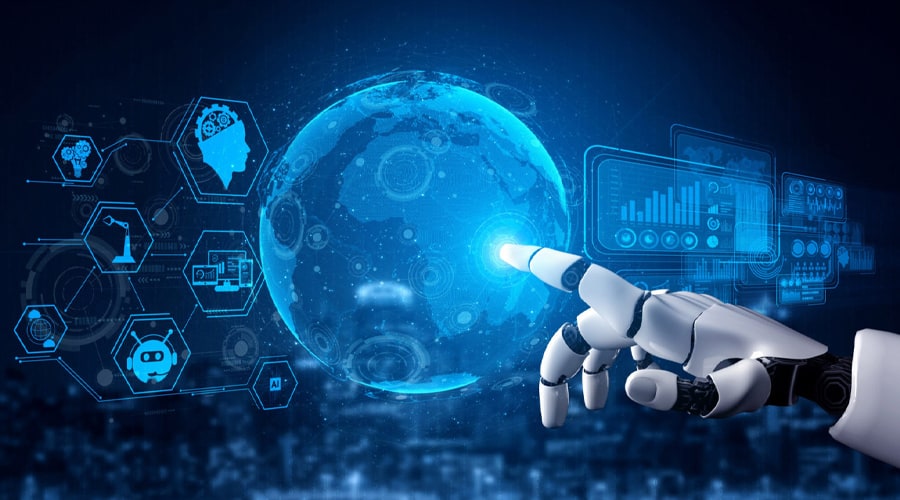Physical Address
304 North Cardinal St.
Dorchester Center, MA 02124
Physical Address
304 North Cardinal St.
Dorchester Center, MA 02124

In today’s world, technology is fundamentally woven into the fabric of daily life. From smartphones that rouse us from sleep to smart home devices that streamline our domestic tasks, technology’s pervasive influence is undeniable.
As it evolves, technology reshapes our experiences, societal frameworks, and even our worldviews. This discussion delves into the myriad ways technology impacts life, highlighting both its advantages and its complexities.
Technology has revolutionized everyday activities. Household chores have been transformed by devices like washing machines and dishwashers, which reduce both time and effort.
Kitchens have turned into technology hubs with smart ovens that precisely manage cooking temperatures and refrigerators that remind us to replenish supplies. On a personal level, wearable technology monitors everything from physical activity to sleep patterns, promoting healthier living habits.
In the professional realm, technology has brought about significant shifts. The rise of telecommuting, especially during the COVID-19 pandemic, was enabled by video conferencing and cloud technologies.
These tools have not only made working from home viable but also desirable, providing flexibility and improving work-life balance. Additionally, automation and artificial intelligence are transforming industries by streamlining operations and boosting productivity, though they also pose risks to traditional jobs.
Technology’s impact on communication has been transformative. The internet has linked the globe in ways previously unimaginable, allowing instant interaction across vast distances.
Social media has redefined how we connect, enabling us to share moments and maintain relationships regardless of geographical barriers. Yet, this increased connectivity has its downsides, such as cyberbullying, the spread of misinformation, and privacy erosion.
Technology has also democratized access to information, enabling people to pursue learning independently through online courses and digital media. However, the digital divide persists, highlighting unequal access to technology which can exacerbate educational and economic disparities.
In healthcare, technology has led to significant breakthroughs that enhance both the quality and efficiency of medical care.
Devices range from simple diagnostic tools like blood glucose meters to complex systems such as MRI scanners, improving the accuracy of diagnostics and treatments. Telemedicine has become a vital healthcare delivery method, providing remote consultations and care, especially to patients in isolated regions.
The advent of personalized medicine, fueled by advances in genomics and biotechnology, offers customized treatment plans based on individual genetic makeups, potentially transforming approaches to diseases like cancer.
However, these innovations also introduce ethical dilemmas and privacy issues, particularly concerning the security of personal data and potential genetic information misuse.
Despite its benefits, integrating technology into daily life brings numerous challenges. Privacy concerns are paramount as the collection of extensive data by various devices can pose significant security risks if not properly managed.
The rapid evolution of technology can also cause social and economic upheaval, presenting difficulties for those struggling to keep pace.
Ethical issues are particularly prevalent in areas such as AI and biotechnology. The development of autonomous weaponry and surveillance technologies prompts serious ethical debates about the trade-offs between security and civil liberties.
Moreover, the use of AI in decision-making, such as in hiring or law enforcement, requires mechanisms to prevent bias that might reinforce societal inequities.
Looking forward, it is evident that technology will further integrate into every facet of human life. The potential of emerging technologies like quantum computing and augmented reality suggests even more significant transformations in how we live, work, and interact.
As we venture into this future, it is vital to maintain a balanced approach that recognizes technological benefits while addressing its inherent challenges.
Technology profoundly influences our world in both overt and subtle ways. While it presents remarkable opportunities for progress and connection, it also poses substantial challenges that necessitate thoughtful consideration and management.
By comprehensively addressing these challenges, society can leverage technological advancements to enhance life without compromising our values or well-being.
As we navigate this ongoing interplay with technology, our focus should remain on ensuring that technology enriches the human experience, not just drives innovation for its own sake.